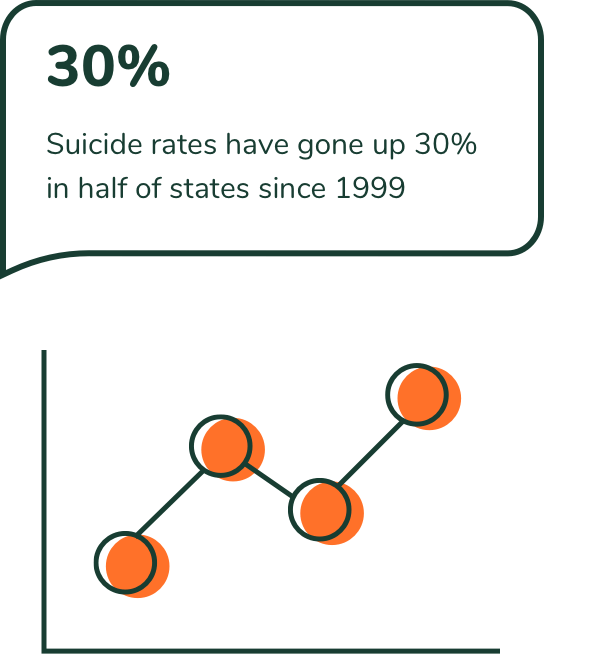Recognizing signs of depression in yourself or someone you care about.


Depression and thoughts of suicide
Talking about this can be hard. It can also save lives.
Sometimes depression feels unbearable. Some people get to the point where life doesn’t seem worth living. Suicidal thoughts aren’t unusual, and they’re nothing to be ashamed of. They’re a sign that it’s time to talk to someone.
Are you thinking of ending your life?
There is help, there is hope, and you are not alone. People are available 24/7 to listen, help, and get you the support you need. You can:
- Call or text the 988 Suicide & Crisis Lifelineexternal at 988
- Text “WORDS” to 988 to start a text chat with the Crisis Text Lifeline.
- Call 911 or go to the nearest hospital


Source: Centers for Disease Control and Prevention
Do you know someone who might need help?
Many people don’t realize that depression is treatable, and never reach out for support. And many people who die by suicide also have a mental or emotional disorder — depression being the most common.1 Other issues related to suicide are relationship problems, substance misuse, physical health problems, and other life stressors and events.2
If you think someone you know might be considering suicide, don’t wait until it’s too late — talk to them about it now. Asking if they’re having thoughts of suicide doesn’t increase their risk for acting on them — and it doesn’t make you responsible for their actions if they do. All you can do is ask the tough questions, help them find support, and do your best to keep them safe. If you’re not sure how to stop them from harming themselves, call the 988 Suicide & Crisis Lifelineexternal or dial 911.
Know the warning signs for suicide
The best way to help prevent suicide is to know what to look for — and be prepared to intervene if you think someone may be in danger. Warning signs include:
- Talking about wanting to die
- Looking for a way to kill themselves, like searching online or buying a gun
- Talking about feeling hopeless
- Talking about feeling trapped or in unbearable pain
- Talking about being a burden to others
- Increasing the use of alcohol or drugs
- Acting anxious or agitated, or behaving recklessly
- Sleeping too little or too much
- Withdrawing or isolating themselves
- Showing rage or talking about seeking revenge
- Having extreme mood swings
5 steps to help someone in crisis3
- Ask the tough question. When somebody you know is in emotional pain, ask them directly: “Are you thinking about killing yourself?”
- Keep them safe. Ask if they know how they would do it, and separate them from anything they could use to hurt themselves. If you think they might be in immediate danger, call the Lifelineexternal.
- Be there and listen to their reasons for feeling hopeless. Listen with compassion and empathy and without dismissing or judging.
- Help them connect to a support system — whether it’s family, friends, clergy, coaches, co-workers, a doctor, or a therapist — who they can reach out to for help.
- Follow up. Reaching out to them in the days and weeks after a crisis can make a meaningful difference — and even help save their life.
Get informed. Get involved.
Everyone can help raise awareness about suicide prevention.
Be prepared to help someone in crisisexternal
Join the #BeThe1To movementexternal
Mental Health America
Centers for Disease Control and Prevention
Adapted with permission from the National Suicide Prevention Lifeline





